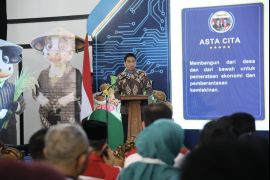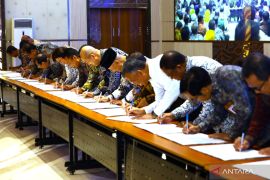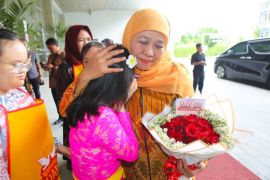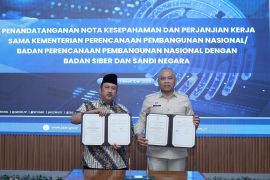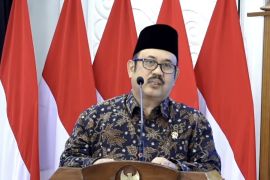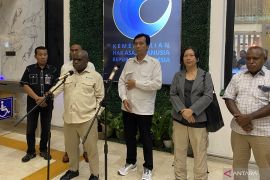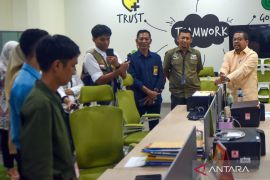The technology will offer durable, cleaner, safer, and smarter products for the home, communications, medicine, transportation, agriculture, and industry, in general.Jakarta (ANTARA News) - Nanotechnology, a new branch of applied science, is expected to contribute positively to the national development in the future.
By modifying particles on an atomic or molecular level, scientists are able to make progress in several fields, including health, biotechnology, and renewable energy.
Indonesia has no reason to ignore the results of nanotechnology research because in its advanced form, such a technology will have a significant impact on almost all industries and areas of society.
The technology will offer durable, cleaner, safer, and smarter products for the home, communications, medicine, transportation, agriculture, and industry, in general.
Not surprisingly, several research institutions, including the Agency for Application and Assessment of Technology (BPPT), the Indonesian Institute of Sciences (LIPI), the National Atomic Energy Agency (BATAN), and some leading universities have begun research activities in the field of nanotechnology.
According to BATAN Chief Djarot S. Wisnubroto, nanotechnology can be used in various sectors, including health, agriculture, chemistry, and energy.
"In the field of agriculture, nanotechnology is used to boost production and reduce deficiencies and wastes. Therefore, BATAN has been involved in nanotechnology research for over a decade, in the field of medicine and environment," Djarot stated in Serpong, Tangerang district, on Monday.
He noted that the use of nanotechnology can also increase the efficiency of lithium batteries used in electric cars.
"Nuclear energy will be one of the viable options in the future, and nanotechnology will also play an important role," Djarot added.
He pointed out that the development of nanotechnology in Indonesia is closely related to the National Electric Cars Program as it will encourage the use of energy-saving batteries.
"There is a relationship between nanotechnology development and the National Electric Cars Program. Both support green energy, which leads to a green economy," he emphasized.
According to the Center for Responsible Nanotechnologys website: http://crnano.org, nanotechnology is the engineering of functional systems at the molecular level that covers both current work and advanced concepts.
In its original sense, "nanotechnology" refers to the projected ability to create items from scratch, using tools and techniques currently being developed to make high-performance products.
Meanwhile, Leonard F. Lindoy, a researcher at the University of Sydney, stated in Yogyakarta, early in December 2013, that nanotechnology was expected to play an important role in the progress of the nation.
Speaking during an open lecture on knowledge and partnership at the Gajah Mada University (UGM), Leonard explained that nanotechnology has several uses: medical applications, aircraft construction, and the development of new materials.
He noted that Indonesia had abundant natural resources and was supported by a large talent pool with the ability to master the ever-progressing nanotechnology.
"In the future, nanotechnology will become an important part of human life, and therefore, Indonesians must master such a technology rather than only being its users," Lindoy emphasized.
Potentially, nanotechnology can boost the efficiency of energy consumption, help clean the environment, and solve major health problems.
It also helps to considerably increase production at significantly reduced costs.
Products manufactured using nanotechnology will be smaller, cheaper, lighter, and yet be more functional and require less energy and fewer raw materials.
Lindoy explained that nanoscience and nanotechnology involved the study and application of extremely small things that can be used across all scientific fields, such as chemistry, biology, physics, material science, and engineering.
Citing the importance of nanotechnology in enhancing the nations self-reliance, the Agency for Application and Assessment of Technology, in 2011, started charting out a nanotechnology roadmap for pharmaceutical and health products.
BPPT Deputy Head for Agro Technology and Bio-Industry Listyani Wijayanti stated that the agency began collecting inputs from different parties in order to complete the roadmap in the next two to three years.
While drawing up the roadmap, the agency also conducted research on nano-herbal products using typical Indonesian herbs such as Sambiloto, which was also related to an herbal scientification program, she added.
She said that by applying nanotechnology, herbal products will no longer produce waste and will be more stable and effective in curing diseases.
According to her, BPPT also cooperated with cosmetic industries in conducting nanotechnology research on herbal plants such as "Pegagan" for use in anti-acne cosmetics and "Khitosan" for use in anti-aging cosmetics.
"Anti-aging and anti-acne cosmetics have a huge market. Unfortunately, none of our national cosmetic companies have enjoyed the benefits of using nanotechnology and thus rely on imported technology and results of research conducted by foreign agencies," she noted.
During a discussion on nanotechnology for pharmaceutical products at the Tangerang-based Center of Science and Technology Research (Puspitek), nanotechnology expert Dr Heni Rachmawati of the Bandung Institute of Technology (ITB) stated that nanoparticles will increase the solubility level of drugs and the transportation and release of active compounds in a controllable manner and improve the stability of relevant drugs.
He said the use of nanotechnology for pharmaceutical products will, in turn, reduce production costs and the toxic effects of drugs in therapy doses.
But National Innovation Committee (KIN) Chairman Zuhal stated that the pro-poor and pro-job nanotechnology development in Indonesia will fail to make significant progress in the absence of collaboration between experts and industries.
"The funds amounting to three million dollars for research in five years is unrealistic, and thus, it is difficult for nanotechnology to grow in Indonesia as compared to China, South Korea, and India," Zuhal explained in June this year.
He said that at the time, there were many sectors such as agriculture, health, and energy that could have benefited from this technology, but unfortunately, there was no progress in its development.
According to him, the problem lies in its development facility and the way it is made useable by industries for the public interest.
Therefore, the Chief of Indonesian Institute of Sciences (LIPI) Innovation Center Bambang Subiyanto said the institute was ready to become the countrys leading institution in the implementation of nanotechnology.
"The research in nanotechnology has gained significant attention, and therefore, LIPI is ready to become the leading institution to implement this technology in Indonesia," he said during a nanotechnology national workshop.
He noted that in the future, the programs of LIPI are expected to speed up the development of nanotechnology in Indonesia and to hold sway in the international community. (*)
Reporter: Otniel Tamindael
Editor: Heru Purwanto
Copyright © ANTARA 2013

